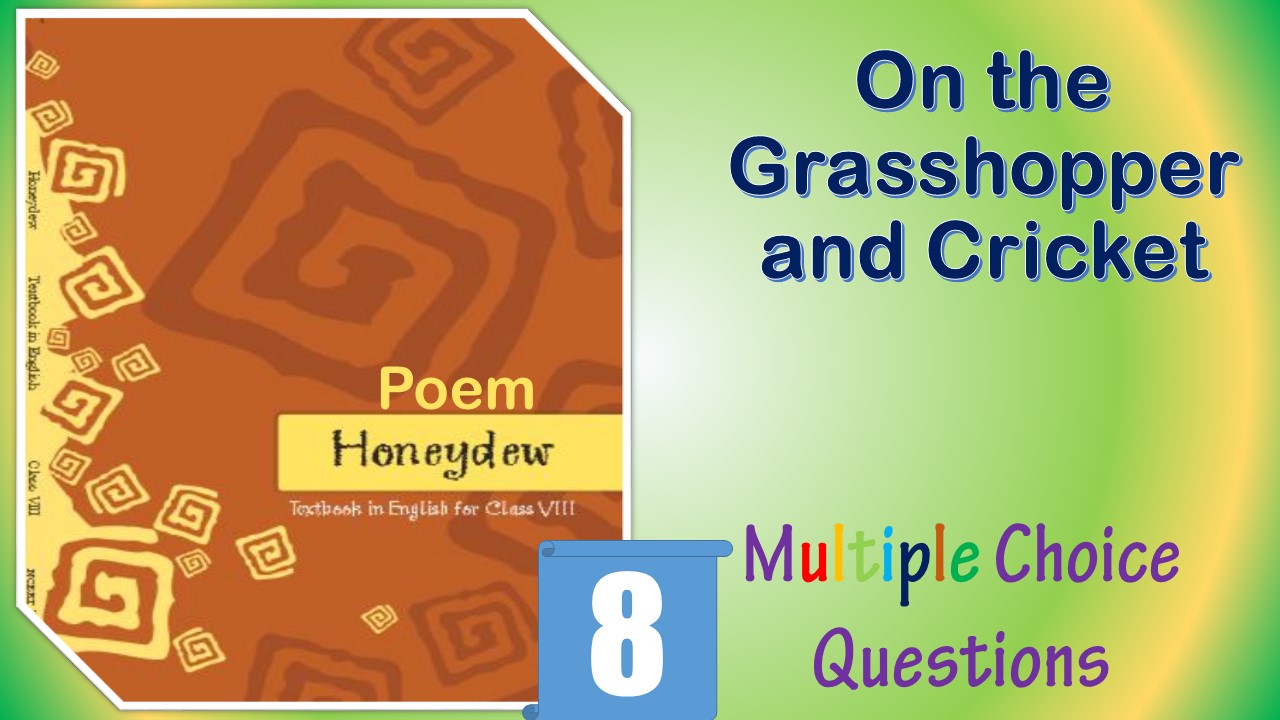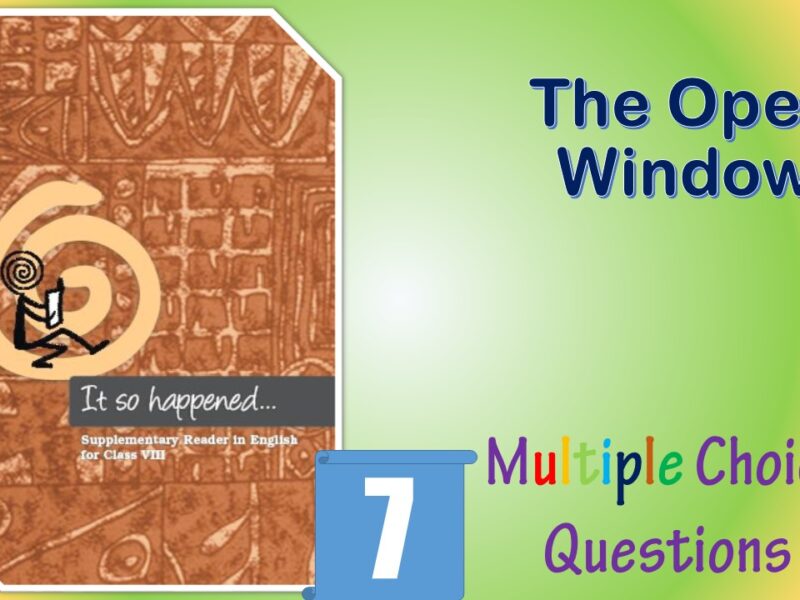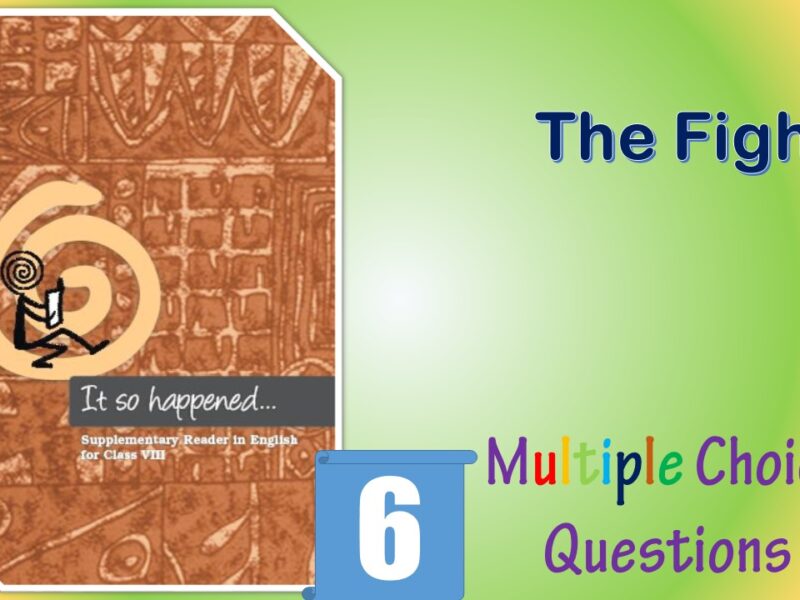Class 8 English Honeydew MCQ On The Grasshopper And Cricket with Answers is Prepared Based on Latest Exam Pattern. Students can solve NCERT Class 8 English Honeydew MCQ On The Grasshopper And Cricket with Answers to know their preparation level.
Students who are searching for NCERT Class 8 English Honeydew MCQ On The Grasshopper And Cricket with Answers are compiled here to get good practice on all fundamentals. Know your preparation level on MCQ Questions for Class 8 English Honeydew MCQ On The Grasshopper And Cricket with Answers. You can also verify your answers from the provided Class 8 English Honeydew MCQ On The Grasshopper And Cricket with Answers. So, ace up your preparation with MCQ of Class 8 English Honeydew MCQ & NCERT Textbook solutions Examinations.
CBSE Class 8 English Honeydew MCQ
On The Grasshopper And Cricket
with Answers
Question :Whose warmth is ever increasing?
(a) Grasshopper’s song
(b) Cricket’s song
(c) Birds chirping
(d) Poetry of earth
Answer : (b) Cricket’s songShow Answer :
Question :Who is the poet of the poem “On the Grasshopper and Cricket”?
(a) John keats
(b) T. S. Eliot
(c) Rabindranath Tagore
(d) Ruskin Bond
Answer : (a) John keatsShow Answer :
Question :Complete the line in Stanza 2 that says, “The poetry of earth is __________”
(a) Never dead
(b) Ceasing never
(c) Dead never
(d) Never ceasing
Answer : (b) Ceasing neverShow Answer :
Question :Who sings the poetry of earth in the summer season?
(a) Grasshopper
(b) Cricket
(c) Crow
(d) Skylark
Answer : (a) GrasshopperShow Answer :
Question :Where does the grasshopper take rest?
(a) Beneath the weed
(b) Behind the stone
(c) Grassy hills
(d) None of the above
Answer : (a) Beneath the weedShow Answer :
Question :Where do the birds take shelter?
(a) Cooling trees
(b) Beneath the weed
(c) Behind the stone
(d) Grassy hills
Answer : (a) Cooling treesShow Answer :
Question :What has the frost wrought?
(a) Poetry of earth
(b) Warmth
(c) Silence
(d) All of the Above
Answer : (c) SilenceShow Answer :
Question :Who sings the poetry of earth in the winter season?
(a) Grasshopper
(b) Cricket
(c) Crow
(d) Skylark
Answer : (b) CricketShow Answer :
Question :What makes the birds faint?
(a) Earth’s poetry
(b) Hot sun
(c) Frost
(d) Rain
Answer : (b) Hot sunShow Answer :
Question :Complete the line in Stanza 1 that says, “The poetry of earth is __________”
(a) Never dead
(b) Ceasing never
(c) Dead never
(d) Never ceasing
Answer : (a) Never deadShow Answer :
Question : Who sings on a frosty winter day?
(a) Ant
(b) Cricket
(c) Grasshopper
(d) Pigeon
Answer :(b) CricketShow Answer :
Question : Why all the birds were fainted?
(a) Hot sun
(b) Heavy rain
(c) Cold breeze
(d) All of them
Answer :(a) Hot sun.Show Answer :
Question : Who sings the poetry of earth in the summer season?
(a) Grasshopper
(b) Cricket
(c) Crow
(d) Skylark
Answer :(a) GrasshopperShow Answer :
Question : Who symbolises the poetry of earth?
(a) Grasshopper and cricket
(b) Cricket
(c) Grasshopper
(d) Ant
Answer :(a) Grasshopper and cricketShow Answer :
Question : Whose voice can be heard in summer?
(a) Ant
(b) Grasshopper
(c) Cricket
(d) All of them
Answer :(b) Grasshopper.Show Answer :
Question : Where do the birds take shelter?
(a) Cooling trees
(b) Beneath the weed
(c) Behind the stone
(d) Grassy hills
Answer :(a) Cooling treesShow Answer :
Question : Which voice runs from hedge to hedge?
(a) Ant’s
(b) Grasshopper’s
(c) Cricket’s
(d) Parrot’s
Answer :(c) Cricket’sShow Answer :
Question : Whom did the poet identify as summer days?
(a) Grasshopper
(b) Cricket
(c) Birds
(d) Ants
Answer :(a) Grasshopper.Show Answer :
Question : Who sings the poetry of earth in the winter season?
(a) Grasshopper
(b) Cricket
(c) Crow
(d) Skylark
Answer :(b) CricketShow Answer :
Question : How do the birds feel during extreme summer?
(a) Faint
(b) Pleasant
(c) Gay
(d) None of these
Answer :(a) FaintShow Answer :
Question : When the poetry of earth brings silence?
(a) Autumn
(b) Winter
(c) Summer
(d) Monsoon
Answer :(b) Winter.Show Answer :
Question : The birds hide in trees because of
(a) rain
(b) tiredness
(c) cold
(d) heat.
Answer :(d) heat.Show Answer :
Question : What does the cricket’s song increase?
(a) Cold
(b) Dryness
(c) Warmth
(d) None of these
Answer :(c) Warmth.Show Answer :
Question : The word ‘cooling’ here means
(a) pleasing
(b) amusing
(c) comforting
(d) brightening.
Answer :(c) comfortingShow Answer :
Question : The cricket’s song
(a) pleases everybody
(b) breaks winter’s depression
(c) makes people angry
(d) is disliked by the people.
Answer :(b) breaks winter’s depressionShow Answer :
Question : Whom did the poet identify as summer days?
(a)Grasshopper
(b)Cricket
(c)Birds
(d)Ants
Answer : AShow Answer :
Question :Where do the birds take shelter?
(a) Cooling trees
(b) Beneath the weed
(c) Behind the stone
(d) Grassy hills
Answer : AShow Answer :
Question :Who sings the poetry of earth in the summer season?
(a) Grasshopper
(b) Cricket
(c) Crow
(d) Skylark
Answer : AShow Answer :
Question :Why all the birds were fainted?
(a)Hot sun
(b)Heavy rain
(c)Cold breeze
(d)All of them
Answer : AShow Answer :
Question :What makes the birds faint?
(a) Earth’s poetry
(b) Hot sun
(c) Frost
(d) Rain
Answer : BShow Answer :
Question :‘The poetry of earth is — dead’
(a)Almost
(b)Always
(c)Never
(d)No
Answer : CShow Answer :
Question : Whose voice can be heard in summer?
(a)Ant
(b)Grasshopper
(c)Cricket
(d)All of them
Answer : BShow Answer :
Question :What does the cricket’s song increase?
(a)Cold
(b)Dryness
(c)Warmth
(d)None of these
Answer : CShow Answer :
Question :How far was Lyonnesse when the poet set out for?
(a) two hundred miles
(b) Hundred miles
(c) Fifty miles
(d) None of these
Answer : BShow Answer :
Question :Name the poet of the poem “On the Grasshopper and Cricket”
(a)P. B Shelly
(b)William Shakespeare
(c)John Dryden
(d)John Keats
Answer : DShow Answer :
Question :Where does the grasshopper take rest?
(a) Beneath the weed
(b) Behind the stone
(c) Grassy hills
(d) None of the above
Answer : AShow Answer :
Question :Who is the poet of the poem “When I set out for Lyonnesse”?
(a) T.S. Eliot
(b) Thomas Hardy
(c) Rabindranath Tagore
(d) Firdaus Kanga
Answer : BShow Answer :
Question :Complete the line in Stanza 1 that says, “The poetry of earth is __”
(a). Never dead
(b). Ceasing never
(c). Dead never
(d). Never ceasing
Answer : AShow Answer :
Question :“The —-‘s song, in warmth increasing ever,”
(a)Grasshopper
(b)Poet
(c)Cricket
(d)Ant
Answer : CShow Answer :
Question :Whose warmth is ever increasing?
(a) Grasshopper’s song
(b) Cricket’s song
(c) Birds chirping
(d) Poetry of earth
Answer : BShow Answer :
Question :Who could have not guessed what happened in Lyonnesse?
(a) The poet
(b) Prophet
(c) Wisest wizard
(d) Both (b) and (c)
Answer : DShow Answer :
Question :“The rime was on the spray” What do you mean by the word “rime”?
(a) Rhyme
(b) Frost
(c) Leaves
(d) Trees
Answer : BShow Answer :
Question :Who could not dare to declare the poet in Lyonnesse?
(a) Prophet
(b) The poet, himself
(c) Wisest wizard
(d) None of these
Answer : AShow Answer :
Question :Whose voice can be heard in winter?
(a)Birds
(b)Ants
(c)Grasshopper
(d)Cricket
Answer : DShow Answer :
Question :Who sings the poetry of earth in the winter season?
(a) Grasshopper
(b) Cricket
(c) Crow
(d) Skylark
Answer : BShow Answer :
Question :Whom did the poet identify as winter evening?
(a)Cricket
(b)Ant
(c)Grasshopper
(d)All of them
Answer : AShow Answer :
Question :What is the meaning of ‘Lonesomeness’?
(a) Lonely
(b) Isolated
(c) Loneliness
(d) None of these
Answer :CShow Answer :
The poetry of earth is never dead:
When all the birds are faint with the hot sun.
And hide in cooling trees, a voice will run
From hedge to hedge about the new-mown mead,
This is the grasshopper’ she takes the lead
In summer luxury—he has never done
With his delights, for when tired out with fun
He rests at ease beneath some pleasant weed.
Question :Who symbolises the poetry of earth?
(a) Grasshopper and cricket
(b) Cricket
(c) Grasshopper
(d) Ant
Answer : AShow Answer :
Question :Which voice runs from hedge to hedge?
(a) Ant’s
(b) Grasshopper’s
(c) Cricket’s
(d) Parrot’s
Answer : CShow Answer :
Question :How do the birds feel during extreme summer?
(a) Faint
(b) Pleasant
(c) Gay
(d) None of these
Answer : AShow Answer :
Question :Name the poem.
(a) The Ant and the Cricket
(b) The Grasshopper and the Cricket
(c) Geography Lesson
(d) The last bargain
Answer : BShow Answer :
Read the stanzas carefully and answer the questions that follow. Tick the correct alternative:
(1)
The poetry of earth is never dead :
When all the birds are faint with the hot sun,
And hide in cooling trees, a voice will run
From hedge to hedge about the new-mown mead,
Question :By ‘the poetry of the earth’, the poet means
(a) a song about the earth
(b) the music of birds etc
(c) the poetry of poets
(d) the pleasures of life.
Answer : (b) the music of birds etcShow Answer :
Question :The birds hide in trees because of
(a) rain
(b) tiredness
(c) cold
(d) heat.
Answer : (d) heat.Show Answer :
Question :The ‘voice’ mentioned here is the voice of
(a) a grasshopper
(b) a cricket
(c) a bird
(d) the poet.
Answer : (a) a grasshopperShow Answer :
Question :The word ‘cooling’ here means
(a) pleasing
(b) amusing
(c) comforting
(d) brightening.
Answer : (c) comfortingShow Answer :
(2)
The poetry of earth is ceasing never:
On a lone winter evening when the frost
Has wrought a silence, from the stone there shrills
The cricket’s song, in warmth increasing ever,
Question :The poetry of earth is
(a) pleasant
(b) unpleasant
(c) constant
(d) loud.
Answer : (c) constantShow Answer :
Question :The winter evening is ‘lone’ because
(a) the poet has no company
(b) there is silence all around
(c) there is frost
(d) it is cold.
Answer : (b) there is silence all aroundShow Answer :
Question :The cricket’s song
(a) pleases everybody
(b) breaks winter’s depression
(c) makes people angry
(d) is disliked by the people.
Answer : (b) breaks winter’s depressionShow Answer :
Question :the word ‘warmth’ in the passage means
(a) loudness
(b) shrillness
(c) heat
(d) cheer.
Answer : (c) heatShow Answer :
(3)
That is the grasshopper’s — he takes the lead
In summer luxury — he has never done
With his delights, for when tired out with fun
He rests at ease beneath some pleasant weed.
Question :the word ‘that’ refers to
(a) the voice
(b) the insect
(c) the bird
(d) the hedge
Answer : (a) the voiceShow Answer :
Question :The grasshopper is happy in
(a) winter
(b) spring
(c) summer
(d) autumn.
Answer : (c) summerShow Answer :
Question :The grasshopper ‘has never done’ means
(a) he is never crying
(b) he is never content
(c) he is always singing
(d) he is always on the move.
Answer : (b) he is never contentShow Answer :
Question :The word ‘beneath’ means
(a) below
(b) neat
(c) above
(d) under
Answer : (d) underShow Answer :
(4)
And seems to one in drowsiness half lost;
The grasshopper’s among some grassy hills.
Question :One is lost in drowsiness because of
(a) the bad weather
(b) the dark night
(c) tiredness
(d) loss of sleep.
Answer : (a) the bad weatherShow Answer :
Question :The lines refer to the song sung by
(a) a grasshopper
(b) a cricket
(c) a bird
(d) a girl.
Answer : (b) a cricketShow Answer :
Question :The passage is describing a scene of
(a) summer
(b) winter
(c) rains
(d) autumn.
Answer : (b) winterShow Answer :
Question :‘Drowsiness’ means
(a) tiredness
(b) depression
(c) half asleep
(d) working.
Answer : (c) half asleepShow Answer :
(5)
The poetry of earth is ceasing never:
On a lone winter evening when the frost
Has wrought a silence, from the stone there shrills
The cricket’s song, in warmth, increasing ever,
And seems to one in drowsiness half lost;
The grasshopper’s among some grassy hills.
Question :Name the poet of the poem ‘The Grasshopper and the Cricket’.
(a) John Keats
(b) William Blake
(c) T.S. Eliot
(d) Rabindranath Tagore
Answer : (a) John KeatsShow Answer :
Question :What happens to the grasshopper during the winter?
(a) Feels sulky
(b) Hides in grassy hills
(c) Sings and gay
(d) Behaves unpleasantly
Answer : (b) Hides in grassy hillsShow Answer :
Question :Who sings on a frosty winter day?
(a) Ant
(b) Cricket
(c) Grasshopper
(d) Pigeon
Answer : (b) CricketShow Answer :
Question :Give meaning of ‘drowsiness’.
(a) dizziness
(b) unconscious
(c) sleepy
(d) awake
Answer : (c) sleepyShow Answer :
(6)
The poetry of earth is never dead:
When all the birds are faint with the hot sun.
And hide in cooling trees, a voice will run
From hedge to hedge about the new-mown mead,
This is the grasshopper’ she takes the lead
In summer luxury—he has never done
With his delights, for when tired out with fun
He rests at ease beneath some pleasant weed.
Question :Name the poem.
(a) The Ant and the Cricket
(b) The Grasshopper and the Cricket
(c) Geography Lesson
(d) The last bargain
Answer : (b) The Grasshopper and the CricketShow Answer :
Question :Who symbolises the poetry of earth?
(a) Grasshopper and cricket
(b) Cricket
(c) Grasshopper
(d) Ant
Answer : (a) Grasshopper and cricketShow Answer :
Question :How do the birds feel during extreme summer?
(a) Faint
(b) Pleasant
(c) Gay
(d) None of these
Answer : (a) FaintShow Answer :
Question :Which voice runs from hedge to hedge?
(a) Ant’s
(b) Grasshopper’s
(c) Cricket’s
(d) Parrot’s
Answer : (c) Cricket’sShow Answer :




